Ducks are remarkable creatures that rely on successful egg incubation and hatching to keep their species thriving. Unfortunately, in the wild and in the backyard, female ducks can encounter several issues that can prevent their eggs from developing and hatching live ducklings.
The entire incubation process from the egg laying to the hatching is an intricate and captivating adventure for any waterfowl.
Female ducks must meticulously prepare for and then care for their eggs in the hopes that they will all hatch into strong and resilient ducklings.
Ducks are often rather private birds and there are several interesting facts about duck incubation and hatching that most people do not know.
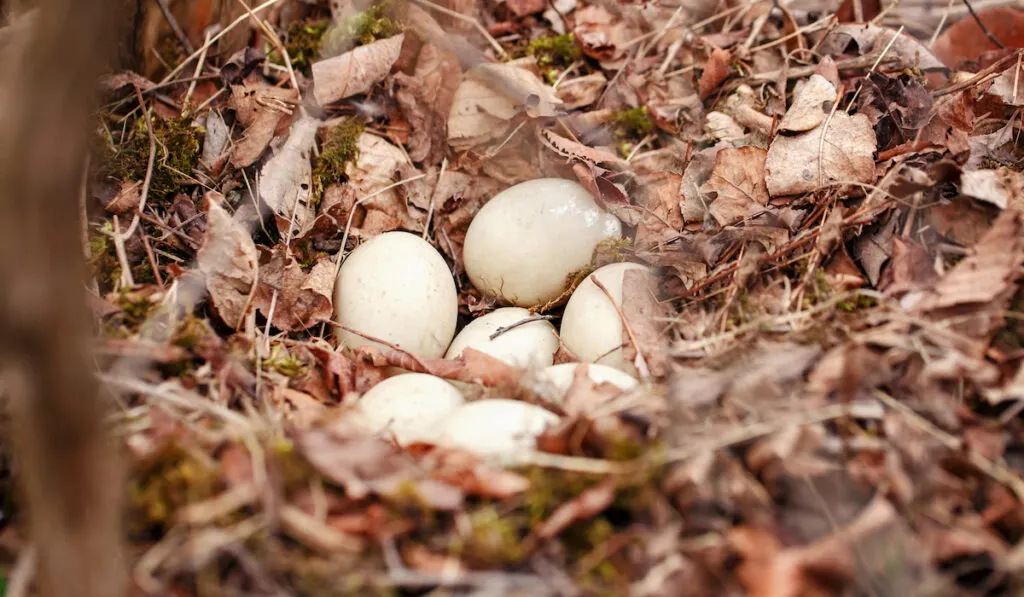
Table of Contents
1. Ducks use some of their own feathers to build their nest.
Ducks must build and insulate their own nests before they lay any eggs. A duck will even pull out most of the down or extra soft feathers that cover her belly and use them in her nest as a type of insulator.
This added layer will help keep heat within the nest. The belly feather removal allows her abdominal area to serve as a direct, uncovered source of heat for her eggs.
2. Ducks lay a clutch of eggs.
A clutch of eggs is the final group of eggs that a single duck lays during a specific nesting/incubation period. Clutches can vary in size depending on the breed of the duck and their surrounding resources.
A healthy duck with a lot of food nearby will lay a larger clutch of eggs than a skinnier duck that is having trouble finding enough food sources. (source)
3. Ducks can lay their eggs for up to 10 days before incubation begins.
After preparing her nest, a female duck will lay her clutch of eggs for up to 10 days. During this time, the duck will not sit on the eggs, apart from the short time it takes to lay an egg.
Once she is done laying, she will begin sitting on the eggs. She will make sure all the eggs have close contact to her smooth belly for added warmth.
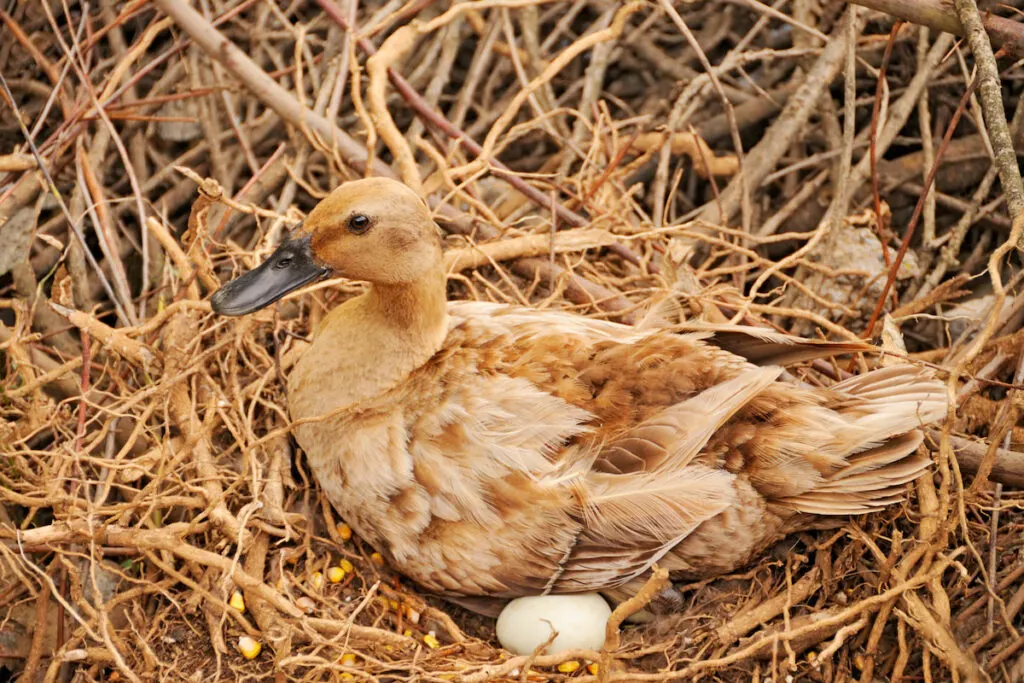
4. Duck eggs are laid on different days, but they will hatch around the same time!
The incubation period starts when the internal temperature of the egg reaches 99.5°F, which happens only when the duck begins continuously sitting on her clutch of eggs. After sitting begins, no more eggs will be laid or added to the nest.
This means that although the eggs in the nest could have been laid up to 10 days apart, they will still hatch around the same time because the incubation timer began at the same time. (source)
5. A duck will stay on the nest for at least 20 hours a day!
Ducks that are incubating eggs cannot leave their nest for too long or they risk impeding the development of their eggs due to lack of constant heat.
It also leaves her eggs at the mercy of potential predators, so she will only leave for up to an hour at a time and typically 3 or less times a day.
This means that altogether, ducks will sit on their nest for around 20-23 hours each day! (source)
6. Incubation periods can last between 26 and 37 days.
On average, it usually takes about 28 days for duck eggs to incubate and hatch. While most ducks including Pekin ducks will likely hatch after 28 days or so, other breeds may take noticeably longer.
The Muscovy duck eggs are known to need up to 37 days of incubation to hatch successfully.
It is important to allow ducks to maintain access to their nest for at least 47 days, including the possible time before incubation begins.
Never just assume that a duck’s eggs are dead because that specific breed’s eggs may take longer to hatch than others. (source)
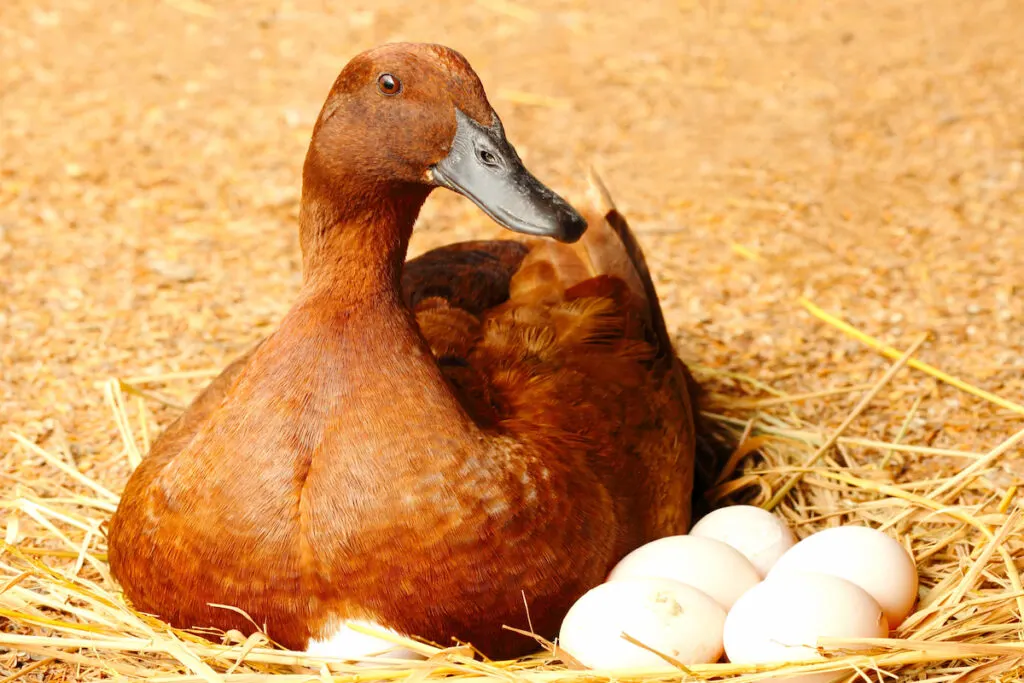
7. Ducks will sit on dead eggs!
It is not intentional by no means, but in certain scenarios, a duck will sit on dead or infertile eggs. A duck that is sitting on their clutch of eggs essentially believes that the eggs are all viable and will eventually produce a duckling.
The truth is that sometimes one or even all the eggs in a clutch may be cracked, unfertilized or simply have a duckling inside that has stopped developing.
The duck will unknowingly continue to sit on the eggs until she is convinced that they are not going to hatch, often well beyond the average incubation days.
8. Ducks will occasionally eat their own eggs.
Like chickens, on rare occasions, ducks may eat their own eggs or possibly the eggs of other ducks. If a duck stumbles upon a cracked duck egg, it is likely that it will eat the egg.
Sometimes, ducks will intentionally crack and eat duck eggs if they are starving or lacking certain vitamins like calcium.
If you own backyard ducks and have an issue with egg eating, make sure you are supplying your ducks with an adequate supply of calcium.
9. It is illegal to take migratory duck eggs.
Migratory birds are protected because successful egg hatching is essential for the future of their breeds. Therefore, unless you have a special permit, it is illegal and punishable by law to even have migratory duck eggs in your possession.
You are not allowed to remove the migratory duck eggs for any reason. If the duck’s nest is in an unsafe area, contact your local wildlife organization and see if they can help with relocating the nest if possible.
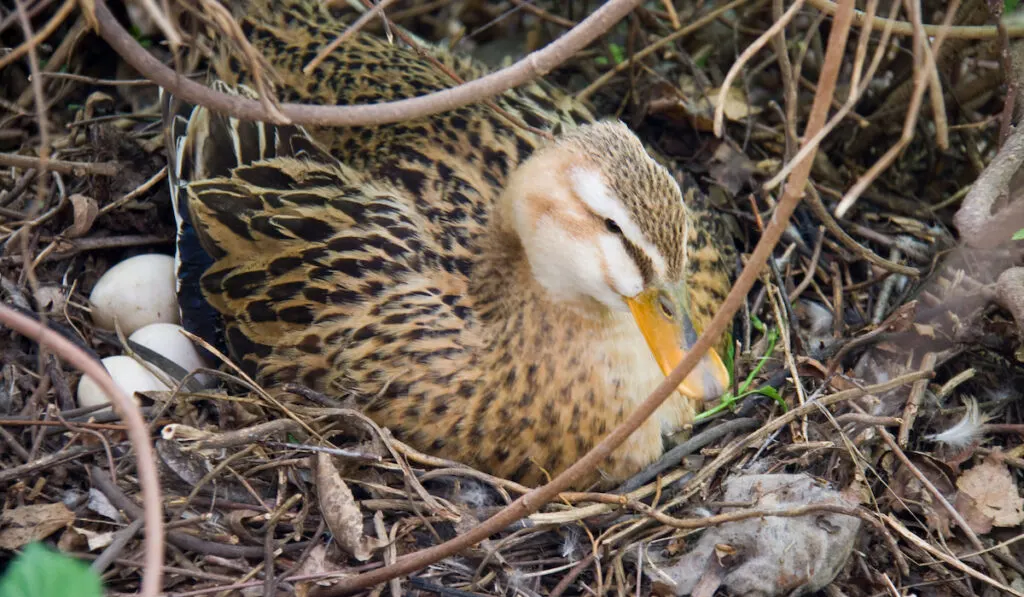
10. Wild ducks may nest in your backyard or on your property!
Sometimes, ducks will make their way to your property and set up their nest, especially if you have large ponds or ample food sources on your property. You may stumble upon a duck and its nest well into the egg incubation period.
Keep in mind that this is only temporary and the ducks will be gone before long. If it is unsafe for them to remain on your property, you should call your local wildlife agency for help. Do not attempt to remove them without the proper permit.
11. Hatching can take up to 24 hours.
Somewhere between 26 and 37 days, depending on the duck breed, the ducklings growing inside the eggs will begin moving and hitting the inside of the egg shell in an attempt to break free.
It can take anywhere from 3 to 24 hours for a duckling to successfully emerge from its shell.
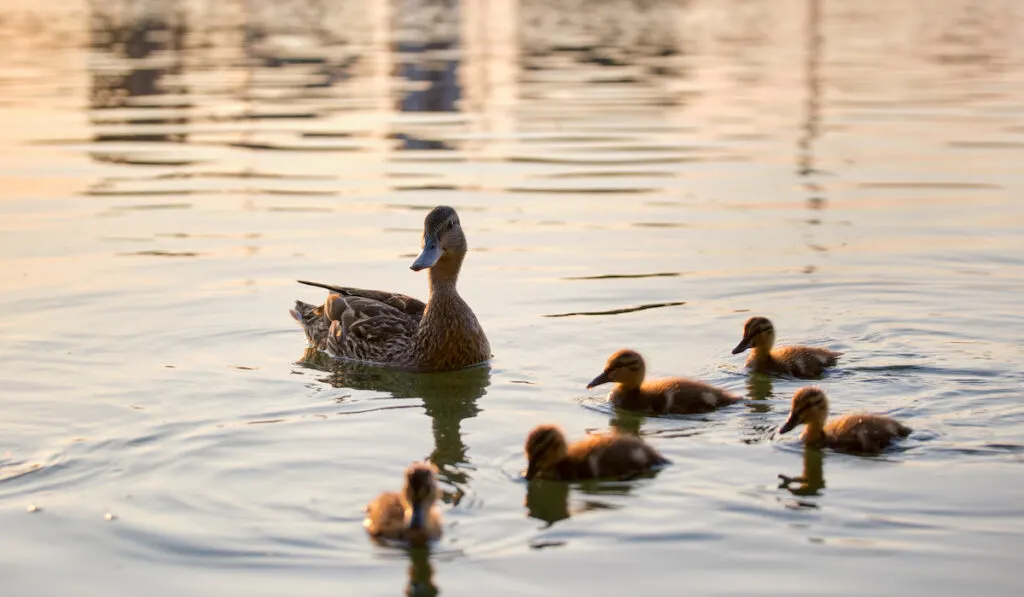
12. A brood is the successfully hatched ducklings from a clutch
A duck’s clutch is the total number of eggs in a single nesting period, while a brood is the final number of live ducklings that are successfully hatched from that same clutch.
It is always possible that some of the eggs in a clutch will not hatch resulting in a brood that is smaller than the duck’s original clutch of eggs. (source)
Final Thoughts
There is a lot more to duck incubation than a duck simply laying an egg and it miraculously hatches a month later. Ducks must remain dedicated to their nest and their only mission in life during that time is to protect the viability of their eggs at all costs and sometimes even that is not enough. The whole process seems to be a rewarding yet highly stressful part of a duck’s life.
Source:
- https://www.ducks.org/Conservation/Waterfowl-Research-Science/The-Incubation-Period
- https://www.ducks.org/Conservation/Waterfowl-Research-Science/Ducks-Nesting-in-Your-Backyard

Denise
Friday 8th of July 2022
Help!! My Muscovy female laid eggs and the male has been occasionally laying on the eggs. Is this normal?
Jennifer McGuire
Tuesday 31st of May 2022
I have rouens and they've just laid their 3rd nest, but this time she's actually been sitting on them. I was too cold the last two time. The only thing I'm worried about is the way she's acting and there is clearly a rotten egg or two in there.
She makes very quick and frantic quacks and runs around frantically looking for food and to clean herself. I've been bringing a bowl of food to her each day, but I'm also worried about the rotten egg/eggs. Should I remove the rotten ones or would it stress her out and make her think I'm stealing them?
She seems to know that I'm helping her when I bring her fresh straw to use when the water level gets high around her nest. She's been using the tall plants around her nest and bending them to fit around her babies, but she's running out of cover. I feel luke the babies should have hatched by now, as it's been a good 4 weeks since we noticed her new nest.
Please help, I don't know if she's delirious, sick, or something from the rotten egg gasses, or she's just being a frantic and hungry momma.
April Lee
Saturday 11th of June 2022
You can always attempt to candle the eggs and remove any that are clearly bad. Also, you can mark the eggs with a pencil or sharpie with the date, then you can check the eggs and remove any that are old. When you have multiple females, it is possible for more eggs to be added.
Since moving / disturbing the eggs to candle them can cause a truly bad egg to break, you may want to wear gloves and an apron just in case. Also, you could remove all of the eggs, let her start fresh and then keep a closer eye on it & try to mark the eggs as they lay for a better idea of how long it has been.
ElBe
Wednesday 25th of May 2022
Little brown duck has left the nest and been gone for two days. Do I leave the eggs there, buried under leaves?
April Lee
Saturday 11th of June 2022
It all depends if the duck is wild or domestic. For wild ducks, leave the eggs be and don't disturb the nest. She may never return but nature will take care of the left over eggs. If she's a pet duck and has just given up sitting, you can toss the eggs. If you are worried they may be fertile you could always candle them first.
Judith A Laing
Sunday 8th of May 2022
Is a duck able to fly with her eggs still inside her?
April Lee
Saturday 11th of June 2022
Yes! At any time a duck can have many eggs inside her, just at various stages of development. Typically, though, there is only one fully formed egg.
gordy
Saturday 9th of April 2022
we recently discovered a mother duck sitting on her nest in our front garden.that was about 4 days ago.i don't think she ever left the nest up until today.today i went by the garden and she was gone and there were 11 eggs in the nest.is this normal.will she be back?
April Lee
Sunday 10th of April 2022
It is normal for her to get up from the nest from time to time. For wild ducks, it is always best to just leave the nest be and not interfere or fidget with it in any way.